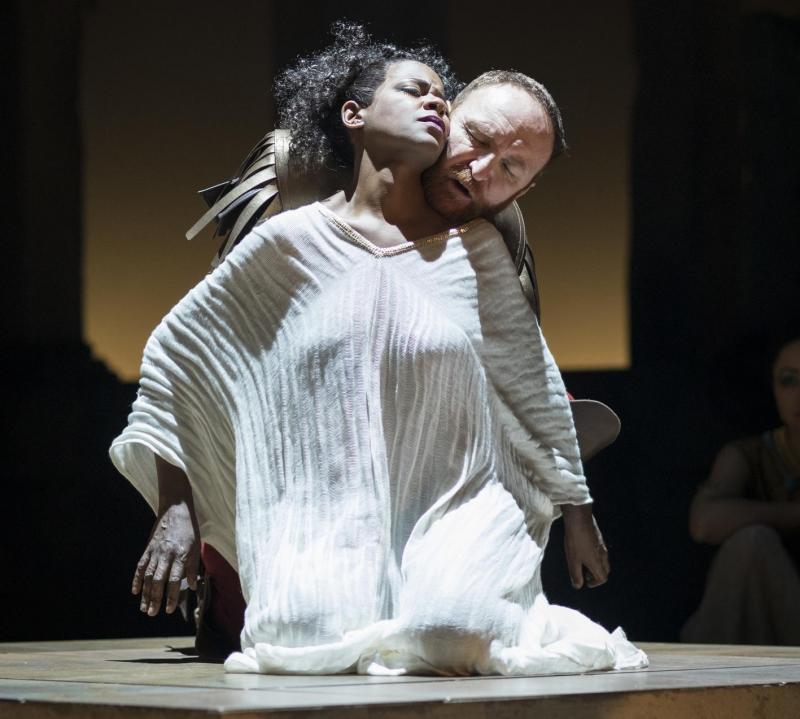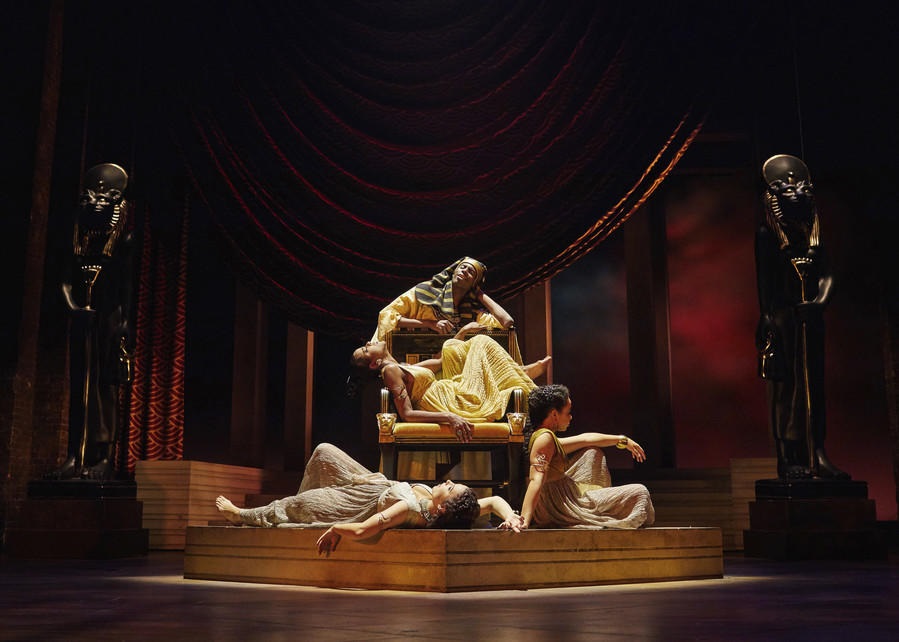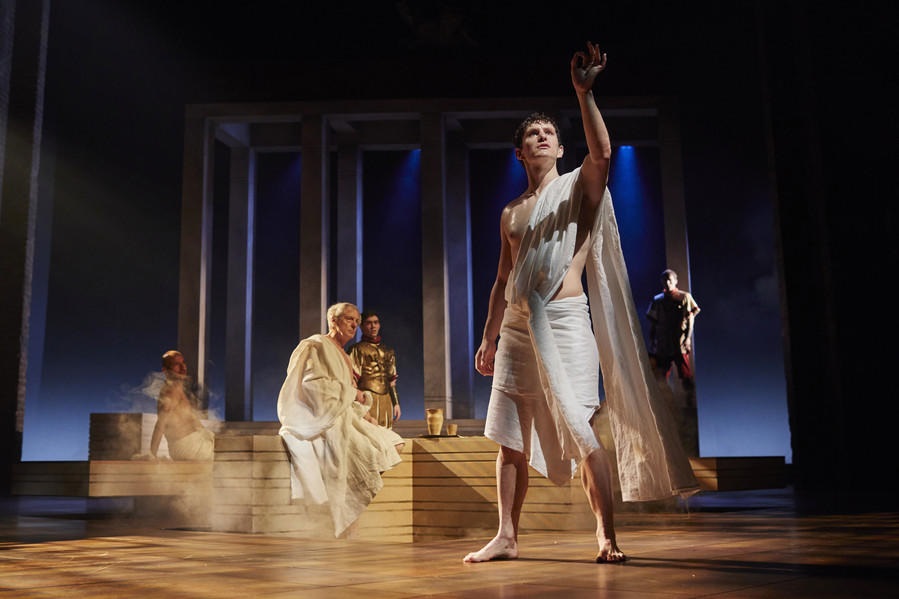Antony and Cleopatra, RSC, Barbican review - rising grandeur | reviews, news & interviews
Antony and Cleopatra, RSC, Barbican review - rising grandeur
Antony and Cleopatra, RSC, Barbican review - rising grandeur
Coquetry and tragic command not quite balanced, but this steady RSC production reaches glory

Is there a key to “infinite variety”? The challenge of Cleopatra is to convey the sheer fullness of the role, the sense that it defines, and is defined by only itself: there’s no saying that the glorious tragedy of the closing plays itself out, of course, but its impact surely soars only when the ludic engagements of the first half have drawn us in equally.
I’m not convinced that Josette Simon, returning to the RSC after a long absence, quite achieves that range, although her late scenes are as powerful as any I have seen. Just as I’m not certain that Iqbal Khan’s production, transferring to the Barbican as part of the company’s Rome MMXVII season, fully captures the sheer seductive languor that is Egypt (pictured below), the femininity that caught the heart, and disarmed the discipline of masculine Rome, persuading Antony to disregard his duty of power and the triumvirate alike.
Transformation is the key to Josette Simon’s performance
That's partly because the Roman scenes work so well here, with an atmosphere that, for all their traditional costuming in togas and doublets, persuasively suggests a more contemporary power play. As Mark Antony (Antony Byrne) and Octavius (Ben Allen) – the former hot from Alexandria, the latter fresh from the baths (lower picture) – meet to parlay their alliance, they could be tycoons engaged in some boardroom conspiracy, their concealed rivalries contrasted by the easy familiarity of their lieutenants, Enobarbus (Andrew Woodall) and Agrippa (James Corrigan).
And what a treat Khan makes of the festive truce gathering on board Pompey’s vessel, with Pompey himself, played by David Burnett, such an attractive fount of impulsive energy (a Roman Hotspur, indeed, with an ebullience from which elsewhere Antony could well have borrowed a note or two). It has the feel of some post-deal management get-together, all-male obviously, with the tipsy elder Lepidus (Patrick Drury) comically abandoning his dignity in a wealth of bewildered and bewildering questions, the stand-offish Octavius keeping his silent counsel, and Pompey’s nobility refusing to countenance the cunning treachery offered him.  Robert Innes Hopkins’s design excels in that scene, which becomes a kind of celebratory pageant, and also does the lion’s share of defining the different atmospheres of Egypt and Rome. The former is dominated by an enormous ruffled hanging drape, its deep red hue catching the sumptuousness of the exotic South, complete with huge cat figures and lighting from Tim Mitchell that achieves beautiful modulations of gold, the latter, with strict back-stage columns that have a whiff of totalitarianism to them, by its sharpness of space. Then, as the second-half action moves into war, it all transforms, the Egyptian drapery combined with broken plinths of distressed antiquity, a mystery of effect enhanced by back-lighting elements.
Robert Innes Hopkins’s design excels in that scene, which becomes a kind of celebratory pageant, and also does the lion’s share of defining the different atmospheres of Egypt and Rome. The former is dominated by an enormous ruffled hanging drape, its deep red hue catching the sumptuousness of the exotic South, complete with huge cat figures and lighting from Tim Mitchell that achieves beautiful modulations of gold, the latter, with strict back-stage columns that have a whiff of totalitarianism to them, by its sharpness of space. Then, as the second-half action moves into war, it all transforms, the Egyptian drapery combined with broken plinths of distressed antiquity, a mystery of effect enhanced by back-lighting elements.
And transformation is the key to Simon’s performance too, as she moves from early mocking japery (much more coquettish than commanding), towards final grandeur. That instinct towards skittish mimicry and comic effect never goes away, however, adding contrast even close to death, as Cleopatra memorably turns an imploring remark to the departing Octavius into a rich chuckle. There’s an abruptness to some of the early modulations, and the change of register sets in early, from “Though he be painted one way like a Gorgon” even: Simon definitively lowers her tones, her voice becoming husky, smoky. She’s ever the performer, ranging from early silliness, through teasing melodrama, towards that final, engrossing hush. Antony Byrne does not travel so far as Antony – he’s the steady warrior rather than the star, but the ascent of his death scene has real power as this leader of men, one who’s most at ease calling them to feast, confronts solitude. Andrew Woodall’s foil as Enobarbus is delicious, with that occasionally camp, always sardonic wit – “This grief is crowned with consolation” is a line from which he draws out its full glory – moving through laconic despair (“Think, and die”), to the merciless pain he applies to his own final moments.
Antony Byrne does not travel so far as Antony – he’s the steady warrior rather than the star, but the ascent of his death scene has real power as this leader of men, one who’s most at ease calling them to feast, confronts solitude. Andrew Woodall’s foil as Enobarbus is delicious, with that occasionally camp, always sardonic wit – “This grief is crowned with consolation” is a line from which he draws out its full glory – moving through laconic despair (“Think, and die”), to the merciless pain he applies to his own final moments.
Setting both off is Octavius, whom Allen plays effectively with a callow craft that mixes sophistry and conniving – a character with none of the range of his opponents in war. As their power ebbs away, their glory of character only grows, in contrast to the new kind of ruler that is Octavius, whom we see transformed in the production’s final moment into a statuary pose, one arm stretched out in empty gesture, a new icon of the new empire. Shakespeare shows us where grandeur lies, and where the everyday, where life gleams rich and golden, and where it has only a shallow, ephemeral patina. It’s to those deeper moods that Laura Mvula’s music, with its washes of sound, vocal anthems, and weighty brass tones, draws us, appreciably helping to move Khan’s production towards eternity.
The future of Arts Journalism
You can stop theartsdesk.com closing!
We urgently need financing to survive. Our fundraising drive has thus far raised £49,000 but we need to reach £100,000 or we will be forced to close. Please contribute here: https://gofund.me/c3f6033d
And if you can forward this information to anyone who might assist, we’d be grateful.

Subscribe to theartsdesk.com
Thank you for continuing to read our work on theartsdesk.com. For unlimited access to every article in its entirety, including our archive of more than 15,000 pieces, we're asking for £5 per month or £40 per year. We feel it's a very good deal, and hope you do too.
To take a subscription now simply click here.
And if you're looking for that extra gift for a friend or family member, why not treat them to a theartsdesk.com gift subscription?
more Theatre
 Deaf Republic, Royal Court review - beautiful images, shame about the words
Staging of Ukrainian-American Ilya Kaminsky’s anti-war poems is too meta-theatrical
Deaf Republic, Royal Court review - beautiful images, shame about the words
Staging of Ukrainian-American Ilya Kaminsky’s anti-war poems is too meta-theatrical
 Laura Benanti: Nobody Cares, Underbelly Boulevard Soho review - Tony winner makes charming, cheeky London debut
Broadway's acclaimed Cinderella, Louise, and Amalia reaches Soho for a welcome one-night stand
Laura Benanti: Nobody Cares, Underbelly Boulevard Soho review - Tony winner makes charming, cheeky London debut
Broadway's acclaimed Cinderella, Louise, and Amalia reaches Soho for a welcome one-night stand
 The Pitchfork Disney, King's Head Theatre review - blazing with dark energy
Thrilling revival of Philip Ridley’s cult classic confirms its legendary status
The Pitchfork Disney, King's Head Theatre review - blazing with dark energy
Thrilling revival of Philip Ridley’s cult classic confirms its legendary status
 Born with Teeth, Wyndham's Theatre review - electric sparring match between Shakespeare and Marlowe
Rival Elizabethan playwrights in an up-to-the-minute encounter
Born with Teeth, Wyndham's Theatre review - electric sparring match between Shakespeare and Marlowe
Rival Elizabethan playwrights in an up-to-the-minute encounter
 Interview, Riverside Studios review - old media vs new in sparky scrap between generations
Robert Sean Leonard and Paten Hughes make worthy sparring partners
Interview, Riverside Studios review - old media vs new in sparky scrap between generations
Robert Sean Leonard and Paten Hughes make worthy sparring partners
 Fat Ham, RSC, Stratford review - it's Hamlet Jim, but not as we know it
An entertaining, positive and contemporary blast!
Fat Ham, RSC, Stratford review - it's Hamlet Jim, but not as we know it
An entertaining, positive and contemporary blast!
 Juniper Blood, Donmar Warehouse review - where ideas and ideals rule the roost
Mike Bartlett’s new state-of-the-agricultural-nation play is beautifully performed
Juniper Blood, Donmar Warehouse review - where ideas and ideals rule the roost
Mike Bartlett’s new state-of-the-agricultural-nation play is beautifully performed
 The Gathered Leaves, Park Theatre review - dated script lifted by nuanced characterisation
The actors skilfully evoke the claustrophobia of family members trying to fake togetherness
The Gathered Leaves, Park Theatre review - dated script lifted by nuanced characterisation
The actors skilfully evoke the claustrophobia of family members trying to fake togetherness
 As You Like It: A Radical Retelling, Edinburgh International Festival 2025 review - breathtakingly audacious, deeply shocking
A cunning ruse leaves audiences facing their own privilege and complicity in Cliff Cardinal's bold theatrical creation
As You Like It: A Radical Retelling, Edinburgh International Festival 2025 review - breathtakingly audacious, deeply shocking
A cunning ruse leaves audiences facing their own privilege and complicity in Cliff Cardinal's bold theatrical creation
 Edinburgh Fringe 2025 reviews: Refuse / Terry's / Sugar
A Ukrainian bin man, an unseen used car dealer and every daddy's dream twink in three contrasting Fringe shows
Edinburgh Fringe 2025 reviews: Refuse / Terry's / Sugar
A Ukrainian bin man, an unseen used car dealer and every daddy's dream twink in three contrasting Fringe shows
 Faustus in Africa!, Edinburgh International Festival 2025 review - deeply flawed
Bringing the Faust legend to comment on colonialism produces bewildering results
Faustus in Africa!, Edinburgh International Festival 2025 review - deeply flawed
Bringing the Faust legend to comment on colonialism produces bewildering results
 Edinburgh Fringe 2025 reviews: Imprints / Courier
A slippery show about memory and a rug-pulling Deliveroo comedy in the latest from the Edinburgh Fringe
Edinburgh Fringe 2025 reviews: Imprints / Courier
A slippery show about memory and a rug-pulling Deliveroo comedy in the latest from the Edinburgh Fringe

Add comment